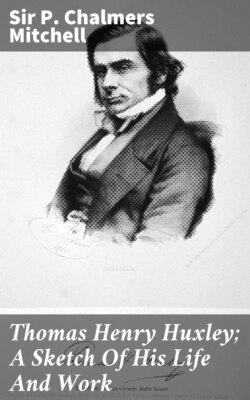Читать книгу Thomas Henry Huxley; A Sketch Of His Life And Work - Sir P. Chalmers Mitchell - Страница 4
Leaders in Science
ОглавлениеPAGE
v PREFACE
1FROM SCHOOL TO LIFE-WORK
Birth—Parentage—School-days—Choice of Medical Profession—Charing Cross Hospital—End of Medical Studies—Admission to Naval Medical Service.
13THE VOYAGE OF THE RATTLESNAKE
The Objects of the Voyage—The Route—The Naturalist and the Surgeon—Collecting and Dredging—Stay in Sydney—Adventures with the Natives—Comparison with Darwin's Voyage on the Beagle.
30FLOATING CREATURES OF THE SEA
The Nature of Floating Life—Memoir on Medusæ Accepted by the Royal Society—Old and New Ideas of the Animal Kingdom—What Huxley Discovered in Medusæ—His Comparison of them with Vertebrate Embryos
46EARLY DAYS IN LONDON
Scientific Work as Unattached Ship-Surgeon—Introduction to London Scientific Society—Translating, Receiving, and Lecturing—Ascidians—Molluscs and the Archetype—Criticism of Pre-Darwinian Evolution—Appointment to Geological Survey.
67CREATURES OF THE PAST
Beginning Palæontological Work—Fossil Amphibia and Reptilia—Ancestry of Birds—Ancestry of the Horse—Imperfect European Series Completed by Marsh's American Fossils—Meaning of Geological Contemporaneity—Uniformitarianism and Catastrophism Compared with Evolution in Geology—Age of the Earth—Intermediate and Linear Types.
89HUXLEY AND DARWIN
Early Ideas on Evolution—Erasmus Darwin—Lamarck—Herbert Spencer—Difference between Evolution and Natural Selection—Huxley's Preparation for Evolution—The Novelty of Natural Selection—The Advantage of Natural Selection as a Working Hypothesis—Huxley's Unchanged Position with regard to Evolution and Natural Selection from 1860 to 1894.
110THE BATTLE FOR EVOLUTION
Huxley's Prevision of the Battle—The Causes of the Battle—The Times Review—Sir Richard Owen attacks Darwinism in the Edinburgh Review—Bishop Wilberforce attacks in the Quarterly Review—Huxley's Scathing Replies—The British Association Debates at Oxford—Huxley and Wilberforce—Résumé of Huxley's Exact Position with Regard to Evolution and to Natural Selection.
128VERTEBRATE ANATOMY
The Theory of the Vertebrate Skull—Goethe, Oken, Cuvier, and Owen—Huxley Defends Goethe—His own Contributions to the Theory—The Classification of Birds—Huxley Treats them as "Extinct Animals"—Geographical Distribution—Sclater's Regions—Huxley's Suggestions.
144MAN AND THE APES
Objections to Zoölogical Discussion of Man's Place—Owen's Prudence—Huxley's Determination to Speak out—Account of his Treatment of Man's Place in Nature—Additions Made by More Recent Work.
167SCIENCE AS A BRANCH OF EDUCATION
Science-Teaching Fifty Years Ago—Huxley's Insistence on Reform—Science Primers—Physiography—Elementary Physiology—The Crayfish—Manuals of Anatomy—Modern Microscopical Methods—Practical Work in Biological Teaching—Invention of the Type System—Science in Medical Education—Science and Culture.
188GENERAL PROBLEMS OF EDUCATION
Establishment of Compulsory Education in England—The Religious Controversy—Huxley Advocates the Bible without Theology—His Compromise on the "Cowper-Temple" Clause—Influence of the New Criticism—Science and Art Instruction—Training of Teachers—University Education—The Baltimore Address—Technical Education—So-called "Applied Science"—National Systems of Education as "Capacity-Catchers."
204CITIZEN, ORATOR, AND ESSAYIST
Huxley's Activity in Public Affairs—Official in Scientific Societies—Royal Commissions—Vivisection—Characteristics of his Public Speaking—His Method of Exposition—His Essays—Vocabulary—Phrase-Making—His Style Essentially One of Ideas.
218THE OPPONENT OF MATERIALISM
Science and Metaphysics—Berkeley, Hume, and Hobbes—Existence of Matter and Mind—Descartes's Contribution—Materialism and Idealism—Criticism of Materialism—Berkeley's Idealism—Criticism of Idealism—Empirical Idealism—Materialism as opposed to Supernaturalism—Mind and Brain—Origin of Life—Teleology, Chance, and the Argument from Design.
232FREEDOM OF THOUGHT
Authority and Knowledge in Science—The Duty of Doubt—Authority and Individual Judgment in Religion—The Protestant Position—Sir Charles Lyell and the Deluge—Infallibility—The Church and Science—Morality and Dogma—Civil and Religious Liberty—Agnosticism and Clericalism—Meaning of Agnosticism—Knowledge and Evidence—The Method of Agnosticism.
245THE BIBLE AND MIRACLES
Why Huxley Came to Write about the Bible—A Magna Charta of the Poor—The Theological Use of the Bible—The Doctrine of Biblical Infallibility—The Bible and Science—The Three Hypotheses of the Earth's History—Changes in the Past Proved—The Creation Hypothesis—Gladstone on Genesis—Genesis not a Record of Fact—The Hypothesis of Evolution—The New Testament—Theory of Inspiration—Reliance on the Miraculous—The Continuity of Nature no a priori Argument against Miracles—Possibilities and Impossibilities—Miracles a Question of Evidence—Praise of the Bible.
261ETHICS OF THE COSMOS
Conduct and Metaphysics—Conventional and Critical Minds—Good and Evil—Huxley's Last Appearance at Oxford—The Ethical Process and the Cosmic Process—Man's Intervention—The Cosmic Process Evil—Ancient Reconciliations—Modern Acceptance of the Difficulties—Criticism of Huxley's Pessimism—Man and his Ethical Aspirations Part of the Cosmos.
275CLOSING DAYS AND SUMMARY
Huxley's Life in London—Decennial Periods—Ill-health—Retirement to Eastbourne—Death—Personal Appearance—Methods of Work—Personal Characteristics—An Inspirer of Others—His Influence in Science—A Naturalist by Vocation—His Aspirations.
287 INDEX
